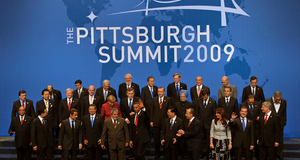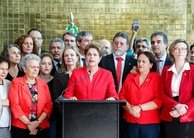Globalization, Inequality, and the Concentration of Wealth in the UK
By
2015, Vol. 7 No. 11 | pg. 1/2 | »
KEYWORDS:
An article in The Guardian last month reported on the extreme and increasing levels of wealth inequality that exist in Britain today.1 The story cited an Oxfam report that highlighted the opulent existence of Britain’s richest family, the Grosvenors, who possess more wealth than 6.3 million people, or ten percent of the population.2 The same article also cited a recent IMF report, which argued that vast wealth concentrations are now so profound that they are actually hindering economic growth on a broad scale.3 Stories like these, exposing the avarice of capitalism, are becoming an almost daily feature of British broadsheets and are testimony to the fact that extreme wealth polarisation and inequality are now major issues for poverty campaigners and economists alike. These trends are both morally repugnant and a reflection of major flaws in the assumptions that underpin free-market economic theory. The free-market is both a mechanism that has facilitated unprecedented growth and development in human history and a wrecking-ball with no morals and the potential to tear societies apart. As inequality spirals out of control, it is becoming increasingly apparent that the government needs to play a more interventionist role in mitigating unchecked capitalism's worst effects. The free-market is both a mechanism that has facilitated unprecedented growth and development in human history and a wrecking-ball with no morals and the potential to tear societies apart. Since the global financial crisis there has been little disagreement amongst economists as to the causes of rising inequality, a phenomenon experienced in many developed post-industrial nations. These causes include the forces of globalization, trade and migration; technological change; and the excesses of unregulated finance.These factors, some of which defy many of the fundamentals underpinning liberal economic theory, all contribute to this polarised and dysfunctional predicament that we find ourselves in. The purpose of this essay is to briefly elucidate the main causes of inequality in the United Kingdom. I argue that it is the British Government's duty to act as a “filter”4 mitigating the effects and protecting society from the imperfect market forces that are tearing it apart. It is the government who shapes the nature of markets through laws and regulations; who creates the rules of the game for corporations; and most important of all who can invest in human capital to create an educated, healthy and dynamic workforce prepared for the uncertainties created by a rapidly changing global environment. Globalization, far from a homogeneous term, vaguely refers to a phenomenon of global “interconnectedness” which we are more aware of today due to technological advancement. Globalization intensifies many aspects of our global economy: markets and their volatility, the movement of capital, goods and people; and international competition between nations.5 This phenomenon is not new, and academics like Melinda Mills argue that globalization effects nations differently depending on how exposed governments allow their societies to become.6 Globalization is often linked to the rising inequalities experienced in developed liberal economies like the UK because of its intense competition in trade, the effects of technology and over exposure to volatile financial markets. There is probably no better example to this exposure than the Global Financial Crisis of 2008 where due to this interconnectedness of financial institutions a U.S subprime mortgage problem led to the near collapse and bailout of a multitude of UK banks, causing a double-dip recession from which our society has yet to fully recover. Many people incorrectly perceive globalization to be a new phenomenon unique to our generation, an enigma whose impact on our daily lives is unfathomable. We have in fact witnessed an incredibly similar epoch in human development at the end of the 19th century, an era characterised by intense global movement of goods, people and capital on a scale similar to that of today.7 Jeffrey Williamson uses this historical analogue to try and determine the how much of an impact globalization can have on inequalities within rich nations. Williamson concluded the powerful migration flows witnessed by the 19th century had a significant impact on global wages. Causing wage convergence and increasing inequalities in wealthy countries, as competition for unskilled labour increased and dramatically pushed down prices.8 As the movement of labour can substitute for the movement of goods, we can see a similar trend occurring in our contemporary epoch of globalization where a liberalised trade policy in the UK is increasing wage inequality with cheaper imported goods driving down wages and destroying entire industrial sectors. This historic parallel illustrates the devastating effects market forces can have in distorting traditional supply and demand trends. The 19th century heralded both unprecedented growth, development and global wage convergence. Just like today the inequalities experienced by wealthy countries were a by-product of these powerful exogenous forces. Globalization therefore amplifies the need for domestic governments to embrace the many benefits it can deliver whilst mitigating the damage these forces can inflict upon society. When drawing any historical parallel we must be aware of the nuance of history. Contemporary migration flows to developed nations are now heavily regulated by government legislation and are of a very different nature. Demonstrating the power of government policy in manipulating market forces, global trends in legal migration between many developed nations are today characterised by the movement of highly-skilled as opposed low skilled workers.9 The International Passenger Survey (IPS) found over the last thirty years UK net immigration increased from 24,000 – 89,000 per annum; and throughout the 1990s there were twice as many professional immigrants as manual.10 Research conducted by Timothy Hatton on these trends concluded that the main reason for an increase in net immigration was a rise in income inequality in UK society.11 Rising inequalities had an impact on migration flows with the UK experiencing an, “increasing return to skills,” where skilled migrants are attracted to unequal societies who offer them more money.12 Simple market forces. These forces are however shaped by government legislation. As Hatton concludes net immigration is due to a, “more permissive UK immigration policy,”13 a policy which one could interpret as importing skill as opposed creating it through more investment in human capital. As the New Labour government were preaching a mantra of “Education, Education, Education” in 2007,14 they had already initiated the Nationality, Immigration and Asylum Act 2002 which introduced a new points system designed to facilitate the flow of high skill labour into the UK.15 Hatton calls this law a, “significant relaxation of policy”; it demonstrates a government awareness of, and attempt to compensate for, a skills deficit amongst its workforce. This open migration policy is evidence of a government who is aware a skills deficit and unwilling to invest in its own populace to address the problem, accentuating a profound wage gap and increasing inequity. Economists generally agree that the UK and other developed nations are experiencing a growing polarisation in income distribution because their economies have recently experienced a radical structural change.16 Due to the effect of global market forces many advanced economies have been transformed from an Industrial to service and high skilled sectors.17 This schism has led to a polarisation of the labour market, removing well paid low-skill jobs like in the mining industry, and complementing either well paid technically advanced jobs or very low paid low-skill jobs.18 There exists a degree of contention amongst economists as to what factors contributed more to this economic shift which has polarised the labour markets of developed nations. Both Robert Gilpin and Paul Krugman refute the notion this shift was precipitated by global trade, where cheaper import competition from developing nations made old industries uncompetitive in a global market.19 Although Gilpin does concede that trade liberalisation has had a redistributive effect on employment citing the impact of the North American Free Trade Agreement has had on the U.S labour market.20 It is undeniable global trade competition played a role in the sectorial shift experienced in the UK during the 1980s. It is now cheaper to import coal from the other side of the world than to excavate it domestically, highlighting the degree of wage competition trade liberalisation has heralded. Some economists place more emphasis on the effect of trade. Econometric studies by Haskel et al concluded trade has had more of an influence than technology on wage inequalities,21 and the prominent British economist Adrian Wood argues low-wage trade competition invigorated the technological advancement in developed economies, accelerating a sectorial shift.22 Most economist believe technology, or Skills Biased Technological Change is responsible for this structural shift in developed economies.23 Technology has replaced the demand for unskilled labour, Joseph Stiglitz demonstrates the impact this has had on wages through marginal productivity theory, where there is far less demand and therefore less financial reward for low skilled jobs.24 Until the 1980s the market rewarded the brawn of heavy industry, but now rewards brain power in an unequal labour market. These powerful exogenous forces which have radically altered the nature of the British economy in an incredibly short space of time, are now through the unequal distribution of income pulling the very fabric of society apart. Yet it is not raw market forces that are to blame. Radically altering the UK economy, precipitating a sectorial shift was a political decision. Markets are a fiction which are shaped and their nature defined through government policy. There are many options available to the UK Government, whose role should be to protect its citizens and cushion the blow from the ferocity of indiscriminate market forces. Babones et al, in a research project searching for a link between trade and inequality found inequality was increasing in Anglo-Saxon nations more as the consequence of neoliberal government policies than international trade.25 There are many policy options that can protect society whilst maintaining a competitive edge against global competitors. The current trade deficit in the UK for goods and services is £2.6 billion, and the trade deficit has been hanging around the £2 billion mark for the last few years.26 This does not mean the UK government should throw up counter-productive tariffs which would make their surviving industries even less competitive. Born out of this competitive global environment is the Strategic Trade Theory (STT).27 STT acknowledges that markets are not perfect, that there exists imperfections in trade and technology and therefore governments should play a proactive role in investing in particular sectors, through Research and Development programmes, to assist those industries in establishing a competitive edge and market share.28 Governments are applying this new theory to intervene and make their economy more resilient to the negative effects liberalised international trade can herald. Gilpin argues if applied effectively this strategy can produce, “a very high payoff for the entire economy.”29 The UK government is falling behind the competition in this respect. Displaying a laissez faire attitude to strategic investment in industry, in 2011 the UK only invested 1.77% of its GDP on R&D, a reduction from the previous two years, and well below the global average of over 2%.30 With competing economies like Finland, Denmark and Norway all investing almost double in R&D at over 3% of GDP;31 it becomes clear that the UK is lagging behind other developed economies and not doing enough to give its industry a competitive edge in a global marketplace. The most important and far reaching action a government can take to protect society from the multitude of threatening market forces is invest in human capital. In economic jargon this means creating a healthy and well educated workforce that is dynamic, industrious and prepared for the changes market forces will herald in the future. This investment can give societies the competitive edge necessary to be successful in a global market place. Investment in human capital, especially education can redress the imbalance in society, creating a better skilled and more flexible workforce who have the necessary tools to contribute to a vibrant economy. It has become almost a truism in economics that more government investment in education is fundamental to redressing the imbalances in society created by this polarising post-industrial sectorial shift. With a more highly educated workforce, British citizens will qualify for more highly skilled jobs which are demanded by the market. The Programme for International Student Assessment (PISA) evaluates how well OECD countries’ education systems are performing. These tables are excellent indicators of how well governments are preparing their workforce to interact in a global marketplace. The UK scored an average in Mathematics and was ranked 26th out of 34 countries, although it spends above average on education.32 This demonstrates how the UK is not preparing its workforce as well as other developed nations for the demands of a global labour market. Furthermore the position in the table does not reflect investment highlighting the need for a drastic revaluation of the entire system. The UK government must also better co-ordinate its education system to provide its workface with skills more relevant and specific for the demands of its domestic market. Last year the Office for National Statistics reported that 47% of university graduates were employed in non-graduate positions, even before the recession the figure stood at an astonishing 37%.33 These figures highlight the deficiencies in the UK education system and its poor coordination with the economy. They show how the UK has a dysfunctional education system which is not preparing its workforce for a highly competitive globalised labour-market. The market rewards relevant skills. The benefit to an economy and society of concerted government investment in training and education have been empirically proven by the Leontief Paradox.34 This theory draws upon the success of the United States agricultural and other labour intensive sectors in the export market despite global competition from low-wage economies.35 This paradox stands as testimony to the effectiveness of government investment and coordination in specialised sectors, and demonstrates how strategic trade theory can be successfully implemented in global markets. One only needs to walk down to a local supermarket in the UK, to witness a high proportion of the staff are University graduates fighting for low-paid temporary contracts to see how the government is failing to adequately prepare its workforce for the demands of a fast moving global marketplace. Education should be used as one of the primary tools in government policy to redress the societal impact of post- industrial structural change and to give its workforce a competitive edge. Instead the UK education system has, due to government legislation, became a source of inequality. The number of UK students in higher education has increased dramatically over the last 50 years, with numbers rising from 400,000 in the 1960s to over 2 million in 2000. The sharpest increase in university attendance was during the 1990s with student numbers increasing from 20% to 33%.36 Economists believe that this upward trend reflects the sectorial change in the British economy.37 Instead of reducing wage inequalities research has shown this trend exacerbated the problem, as the increasing numbers disproportionally represented wealthier students.38 The increase in University attendance has simply re-enforced the inequalities inherent in the British society.39 The socio-economic cleavage between students has widened incrementally from 14% in 1981; 30% in 1993; to a 37% difference in 1999.40 These findings correlate with similar studies in other developed nations suffering from inequalities. The only other study in the UK of this kind, Glennerster (2001) found a “sharp” increase in the gap between students with or without professional parents.41 Both Kane (1999) and Pischke (2001) also found an increasing gap in college attainment in the U.S between social classes.42 These statistics infer that the British higher education is a highly exclusive system and increasingly only available to the affluent in society, re-enforcing inequalities instead of re-dressing the cleavages in society. The incremental nature of these findings also have grave implications for future generations if these trends are to continue. Blandon and Machlin demonstrate how these cleavages in university attendance are a direct result of government policy. Between 1977 and 1984 students received the best state support: their tuition fees were paid for, they qualified for welfare support and even received an additional grant for the cost of living.43 As student numbers increased throughout the 1980s, reflecting the structural change to the economy, conservative government policies gradually eroded the state support offered to students to compensate for the increase in numbers.44 This reflects an attitude still present today where higher education is not viewed as a nationwide economic investment but a burden to tax-payers. We can see how government policy has had a direct impact in amplifying the growing class divide in education; with dramatic changes introduced just at the moment where more investment by the state was required to assist the workforce in adapting to the structural shift in the economy. Instead of acting to support the population through this structural change, government policy has made higher education the preserve of the privileged in society, accentuating a growing divergence in incomes and inequalities. This discriminatory education system, based on the ability to pay rather than learn, is becoming even more exclusive through current UK government policy. In 2010 the government tripled tuition fees from £3000 to £9000, and are now not ruling out further increases; because the government has overestimated how much graduates will be able earn in the British economy.45 This demonstrates how government policy is making higher education, a pre-requisite for survival in a post-industrial developed economy, a preserve of the wealthy in society. Furthermore, the fact that graduates are not earning as much as predicted and struggling to pay off their debt highlights another failure of the education system: not supplying the market with relevant skills. Blandon and Machlin conclude their research on the inherent and growing inequalities in the education system with a prophetic warning on the implications their findings have for future generations and society. These trends, showing capital as the main qualification for higher education, will intensify the concentration of wealth in society and amplify intergenerational immobility and inequality.46 These findings correlate with the profound observations made by Pierre Bourdieu on how capital accumulates over time and, reproducing itself, creates different opportunities and constraints for different social classes.47 Bourdieu argued cultural capital, effectively the ability to afford education, is the most effective and discrete method of the hereditary transfer of wealth.48 As different “reproduction strategies” are clamped down upon by societies attempting to re-dress inequalities and concentrations of wealth, the importance of an exclusive education system is accentuated in facilitating the hereditary transfer of wealth.49 In this light, given the recent increase in cost, the British higher education system can be interpreted as a conduit for the preservation of wealth and privilege as opposed a mechanism to decrease inequalities. Some economists, like Jerry Muller, would disagree with this position. They contend the role of the family is more critical in preparing a child for survival in a capitalist world.50 Muller views the formative years of a child as the most important and the family as the “incubator of human capital,” arguing children nurtured in a stable two parent household will be more successful.51 Millar’s argument talks of the importance of “genetics” and “hereditary endowments” being rewarded in a meritocratic environment whilst downplaying the role of economic capital as being “less significant.”52 As interesting as these arguments are, they are based on the premise that a similar standard of education is available to everyone in developed nations.53 Citing the UK higher education system, this is a contention we have found to be incredibly idealistic especially in post-industrial societies with an already unequal distribution of wealth. So far we have appraised the escalating inequalities in British society through the analytical lens of the government being a filter whose purpose is to protect society from the numerous exogenous pressures it faces from global market forces. We have found that the Government has consistently failed to offer satisfactory protection and many policies have in fact amplified the problem. These exogenous pressures account for a growing increase in wage inequalities; they do not explain how five families in the UK now possess more wealth than 20% of the nation.54 We should therefore ask ourselves what is the nature of this filter? If it is not protecting the majority of society then who does the government represent? The more we analyse this filter we find it represents the interests of a very few in society, through laws and regulations it has set the rules of the game and they favour big corporations and finance. James Galbraith, author of, “Inequality and Instability,” argues that the primary factor creating an increase in inequalities is the “financialisation” of developed nations: where financial sectors dominate rather than serve the economy.55 He concludes it is the unwillingness of politicians to address this problem which has led to such asymmetrical wealth distributions.56 Most economists, left and right, are now in agreement that the main cause of the vast concentrations of wealth in developed nations is the failure of political systems to control and effectively regulate powerful financial institutions and corporations. 57 There is a growing opinion that most contemporary rules and regulations in nations like the UK have created a “framework” which disproportionately benefits moneyed interests at the expense of the rest of society; and it is this collaboration, exposed through the financial crisis, that is at the heart of inequalities in the UK.58 The financial crisis exposed the extent of the problem of rent-seeking in liberal economies like the UK. Rent-seeking is a broad term accounting for any means whereby income is derived from taking wealth as opposed participating in wealth creating ventures.59 It manipulates liberal economic theory to take advantage and maximise profit from market imperfections; its flawed assumptions of perfect competition and information; its inherent inefficiencies that even Adam Smith alluded to.60 Rent-seeking in the UK takes many forms. It usually relies on government legislation to create an environment of inefficient and imperfect markets to maximise profit.61 A good example of this practice is the LIBOR interest rate scandal in the UK, where banks manipulated the inter-bank interest rates, effectively providing false information to the markets to maximise their profits; it is alleged by some City traders this market manipulation had been occurring since the 1980s.62Continued on Next Page » Suggested Reading from Inquiries Journal
Inquiries Journal provides undergraduate and graduate students around the world a platform for the wide dissemination of academic work over a range of core disciplines. Representing the work of students from hundreds of institutions around the globe, Inquiries Journal's large database of academic articles is completely free. Learn more | Blog | Submit Latest in Economics |


















